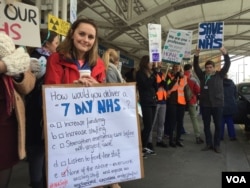Thousands of junior doctors are on strike in the British public health system's first all-out stoppage by doctors in a wage dispute.
The 48-hour strike is tying into the current heated debate on whether Britain should leave the European Union, with politicians saying less than three weeks' worth of British contributions to the European Union would be enough to settle the labor dispute.
Meanwhile, the latest poll shows support for leaving the European Union has grown slightly.
New contract dispute
The doctors are protesting changes to their pay scale. Currently, they are paid more for working night hours, as well as Saturdays and Sundays.
Under a new contract, they would receive no extra pay for working on Saturdays. Instead, they would get a general raise, which strikers say still amounts to a pay cut.
The government wants to enact the change in order to cope with the cost of running the National Health Service, which has been rising due to what politicians say is an influx of immigrants and an aging population.
The labor dispute, on the surface, has nothing to do with the debate on a June 23 referendum in which British voters will decide whether Britain remains in the European Union.
That was the case until a Cabinet minister, Commons Leader Chris Grayling who favors a British exit, this week said the government could settle the doctors’ issue with less than three weeks’ worth of contributions that Britain pays to the European Union.
“It would be so much easier to pay for that change if we took back control of our $510 million a week contribution to the EU and spent it on our priorities,” he said.
Brexit
His words did not appear to resonate among a group of young doctors picketing Tuesday outside London’s Chelsea and Westminster Hospital, who saw few connections between the two issues.
“I have political ideas and I have a stance on the EU, but that’s certainly not why I’m on strike today,” Eoin Dineen, a 29-year-old doctor who has been practicing medicine for five years, told VOA.
“It doesn’t work like that is my first thought,” said Ros Kings, another doctor picketing nearby.
“I don’t think that discussion has any relevance to our contract disputes. I think if potentially we left, and if it saved money that money wouldn’t go to the NHS so I don’t think it’s potentially relevant,” she said. “It would go to something else, and I don’t know what, but it would be spread thinly. There’s not enough money. There’s never enough money. There won’t be enough money if we leave Europe, there won’t be enough money if we stay in Europe.”
Both Dineen and Kings said they personally support remaining in the European Union.
European experience
Dineen, who received an EU scholarship to study medicine for seven months in France, says the experience of dealing closely with other young Europeans convinced him that engagement is key to avoiding wars like the two world wars that ravaged Europe in the 20th century.
“We were sitting around having dinner and discussing politics and ideas and just swapping friendships with young German men, young Austrian men, young Spanish men, Polish men, Hungarians, all of whom I’m thinking, ‘God, what great guys you are. I certainly would never go to war with you,’” Dineen said.
The debate over Britain’s possible exit from the European Union, known here as Brexit, became even more heated during the past few days when President Barack Obama, on a three-day visit to London, called for Britain to vote to remain in the bloc.
The remarks angered those who favor Brexit.
The latest ORB poll conducted for the British newspaper The Telegraph, says support for remaining in the European Union declined by two points to 51 percent, while support for leaving the European Union increased also by two points to 43 percent, with three percent still undecided.






